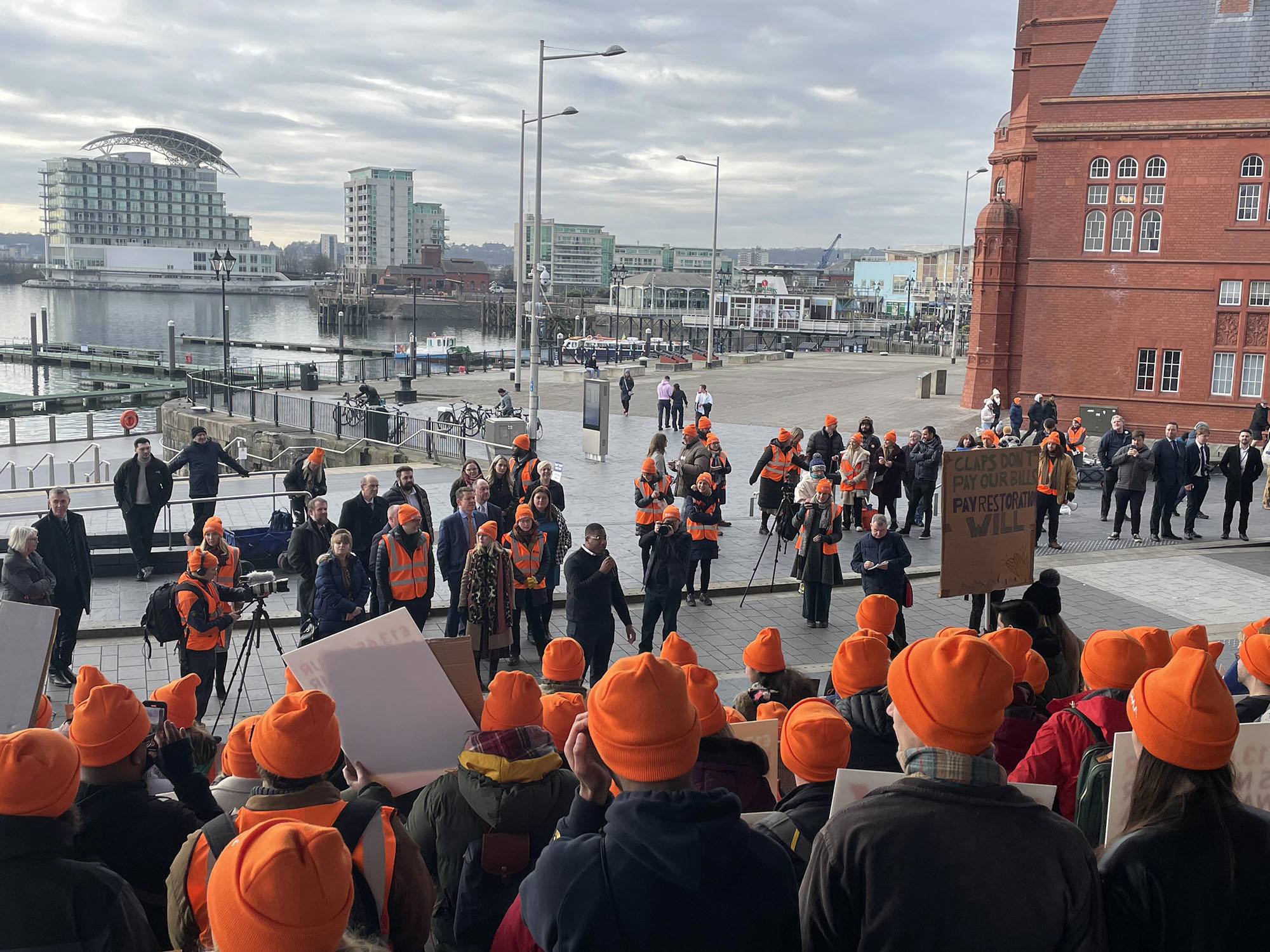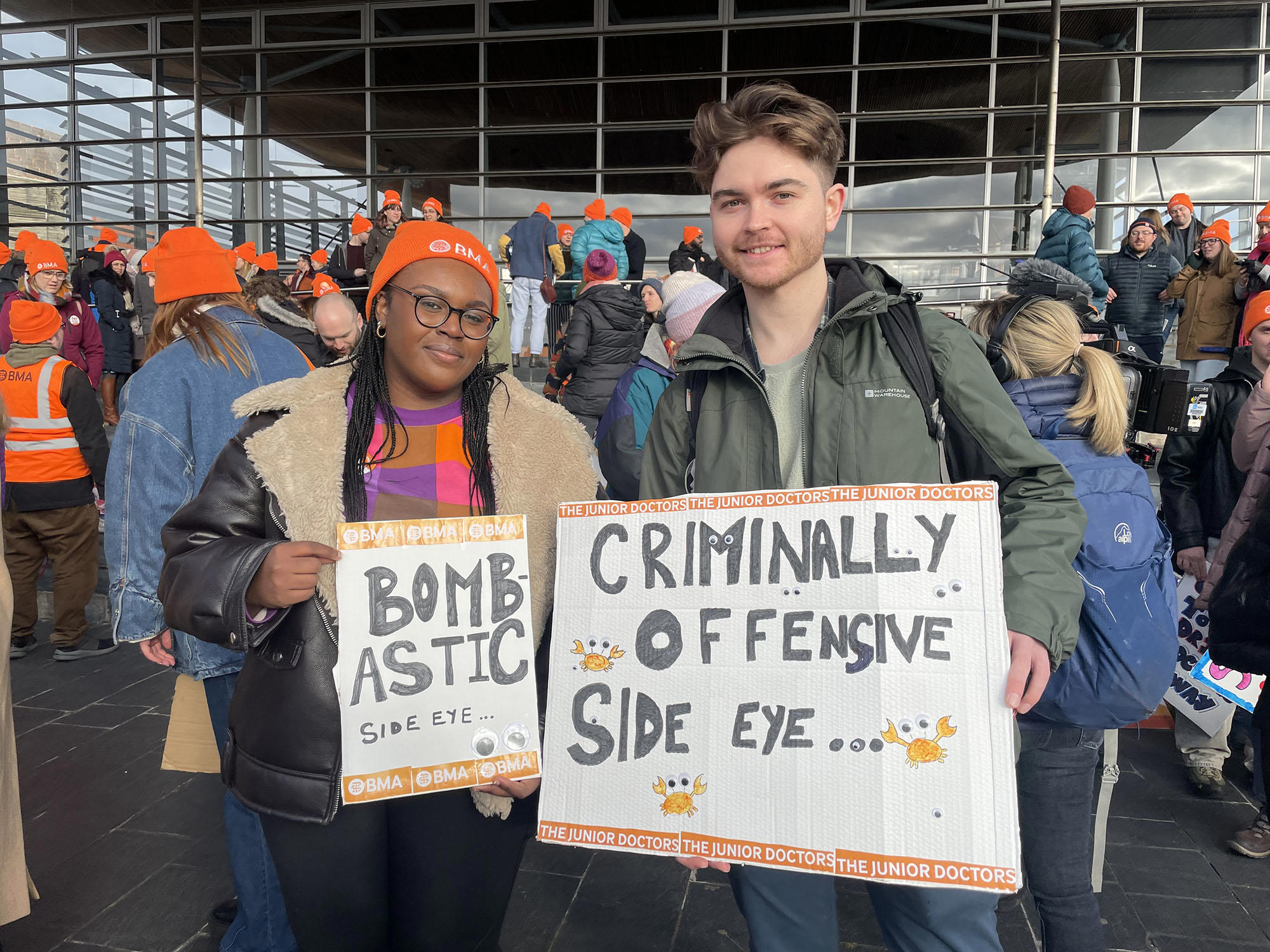Junior doctors in Wales gathered outside the Welsh Parliament to deliver a ‘powerful message’ to the devolved government about the need to restore pay and prevent doctors leaving Wales.
Thousands of doctors descended on the Senedd Cymru on the second day of the 72-hour walkout by nearly 4,000 junior doctors in Wales.
The industrial action – the first in Wales of the BMA’s current pay restoration campaign – came after the Welsh government offered junior doctors a 5 per cent uplift last year, less than the 6 per cent and one-off lump sum offered to their colleagues in England, who are still striking until they receive an offer they consider ‘credible’.
It has left newly-qualified doctors in Wales earning just £13.65 an hour – almost £2 an hour less than the £15.50 junior doctor in England now get paid. They are asking for pay to be restored to 2008 levels, since when it has eroded by nearly 30 per cent.
The Labour-led Welsh government has said it wants to restore doctors’ pay but has blamed a lack of funding from the Conservative government in Westminster.
 Dr Babs-Osibodu addresses rally
Dr Babs-Osibodu addresses rally
Addressing the crowd Oba Babs-Osibodu, co-chair of BMA Wales junior doctors committee, said the impact of pay erosion, and the worst uplift offered in the UK last year, shows ‘it is clear that it’s less attractive to work and to train in Wales as a result’.
The ‘knock-on effect’ is higher rates of burnout than ever among doctors, and an inability to deliver the level of service they want to – and would be capable of – in adequately-staffed hospitals.
‘Every day we are sacrificing ourselves for a system that is fundamentally broken,’ he told the rally. ‘We receive nothing but contempt in return.’
Dr Babs-Osibodu said ‘no doctor today is worth less than a doctor that came before’ as he reiterated the ‘fair’ and ‘reasonable’ ask of restoring pay to 2008 levels, since when it has eroded by 29.6 per cent in real terms.
But he said this week’s 72-hour walkout has ‘sent a powerful message to government’.
‘We’ve said we are not going to back down, we’re not going to accept this any longer,’ Dr Babs-Osibodu added.
‘At the end of the day this is what we deserve,’ he said, explaining that this is not just about the current generation of junior doctors but about securing fair pay for ‘every doctor that is yet to come’, ‘for an entire generation of doctors and beyond’.
‘This is just the beginning for doctors in Wales. And although we will face challenges, we have to stay strong. We have to continue on this path; we have to fight, we have to strike, because that is the only way we will win.’
Prepared to fight
Fellow co-chair Peter Fahey praised the ‘incredible show of strength and unity’ by BMA Wales members in his speech.
‘I see in front of me a generation of doctors ready to fight for what they are worth,’ he said. ‘We will make pay erosion a thing of the past.'
He said this week’s first full walkout of junior doctors in Wales had ‘made history’: ‘For too long we have stayed quiet. Strike action is the only way for our collective voice to be heard.’
Dr Fahey said the public have been ‘shocked’ to hear foundation year 1 doctors earn as little as £13.65 an hour in Wales, while struggling to pay off ‘huge’ student debts they have accrued during medical school.
‘What we are asking for is not unreasonable,’ he said. ‘Nor is it unaffordable. The Welsh government cannot afford to lose any more doctors.
‘You work so hard, you give so much of yourselves every single day and yet you are expected to do all of this for less every single year.
‘Our strike is an act of self-respect. This is a fight for fair pay, for a reversal of the cuts that have been imposed on us. This is the first time we are coming together in Wales but it will not be the last.
‘This is a fight we cannot afford to lose, not just for ourselves but for the entire profession and the next generation of doctors to come.
‘The journey ahead will put our collective resolve to the test but if we stand together and make our voices heard we can no longer be ignored.’
Leader's support
Emma Runswick, deputy chair of council for the BMA, made the trip to Cardiff to show support from the BMA in the rest of the UK.
She rallied the crowd with chants and urged them to ‘keep going’ and ‘keep on organising’, ‘especially through the cold months’ ahead.
Dr Runswick encouraged Welsh members to return to their hospitals after the strike action with a message of solidarity and hope and to have the confidence to ‘kick up a fuss’ about all issues that affect doctors’ working lives.
‘A union that can win pay restoration is a union that can win anything,’ she told the crowd.
‘We do not have the ability to continually cut doctors’ pay and maintain the NHS that our patients deserve.
‘This fight did not start yesterday, it started with a commitment from ourselves that we were no longer going to let the NHS be denigrated, to be driven into the ground by governments.’
She stressed the importance of the Welsh government’s commitment to work towards the principle of pay restoration.
‘They have shown here that those words were not worth any more than the paper they were written on,’ she said. ‘For shame.’
‘You are not worth less than your colleagues across the border in England.’
'Derisory' offer
The rally also heard from Plaid Cymru health spokesperson Mabon ap Gwynfor, who said the Labour-led Welsh government’s 5 per cent offer was ‘derisory’ and urged it to renegotiate with the BMA to ensure doctors in Wales are ‘recompensed as you should be for the work that you do’.
Doctors in the crowd said the rally had given them a renewed sense of hope and momentum.
Poppy Tidswell, a foundation year 2, was among the contingent who travelled two hours from Glangwili to Cardiff for the rally.
She said: ‘Being in the big centre has made the doctors in the smaller communities feel more empowered.
‘Because we’re a smaller hospital, we didn’t have a huge picket line, so coming here shows the scale of what we’re doing.’
Common cause
Alice Tayler, a senior house officer and junior medical fellow who works at the Aneurin Bevan University Health Board NHS Trust, said: ‘This has been a chance to reconnect with doctors who we might have worked with before, or went to medical school with.
‘When you’re working, trudging through, you don’t have the opportunity to talk to other doctors about what they’re going through. Everyone here is in the same position so we can get together and talk about why we’re on strike, which is for all of us.’
Bláithín Thomasius, a foundation year 2 based in Glangwili, said of the week’s strike action: ‘The response from patients has been incredible. It’s not just us, as doctors, asking for fair pay – patients understand it’s for their benefit too.’
She said Wales’ strong history of trade unionism has made striking feel more supportive: ‘Lots of people have been honking and expressing their solidarity.
‘People have seen the effects on their communities before and understand how important it is to go on strike and have your own voice.’
 Dr Okechukwu (left)
Dr Okechukwu (left)
Theodora Okechukwu, a foundation year 2 working in Llanelli, said the feeling among doctors in Wales was that the offer made by the devolved government was a ‘slap in the face’ after the commitment to work towards pay restoration.
She said its excuse to blame the government in Westminster was unfounded, using the example of the Scottish government’s offer to junior doctors, which was accepted, as an example.
‘Scotland also answers to Westminster, but they have given a higher offer. If fair pay is a priority for a devolved government, then they can make it happen.
‘Even if your priority is to keep patients safe, the decision should have been taken to pay doctors appropriately, so that they don’t leave Wales to work elsewhere.
‘We want patients in Wales to have just as good care as other places in the NHS, and that’s why we’re on strike.’

